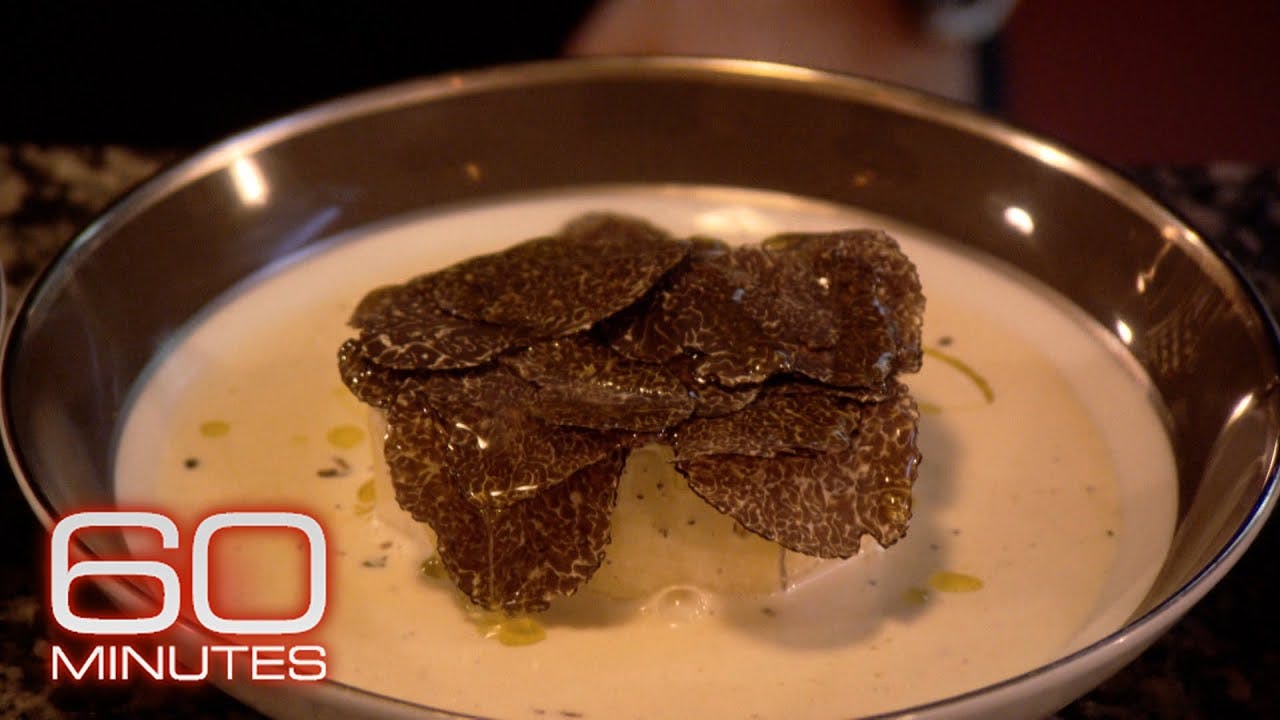The Most Expensive Food in the World; Ina Garten; Pasta Pavarotti | 60 Minutes Full Episodes
()

The Most Expensive Food in the World (00:00:11)
- Truffles, particularly black and white varieties from France and Italy, are highly prized and expensive delicacies, known as "black diamonds."
- Truffle scarcity is rising due to climate change, trafficking, and inferior imports.
- Trained dogs locate ripe truffles at the base of oak trees in truffle-producing regions with red soil and rainy summers.
- Truffles command high prices, reaching thousands of dollars for a small amount, attracting organized crime and black market activities.
- The growing black market leads to restaurant thefts and concerns about climate change's impact on truffle harvests.
- Chinese truffles are inferior to French truffles and often mixed with them for higher prices, deceiving American consumers.
- Spores from Chinese truffles threaten European soil and the renowned French gastronomy.
- The white truffle from Alba, Italy, holds the title of the most expensive food globally.
- White truffle prices fluctuate based on season and availability, with a notable sale of $103,000 in 2021.
- The high cost is attributed to rarity and labor-intensive harvesting by trained dogs in northern Italy.
- White truffles possess an earthy, musky, and pungent flavor, commonly used in Italian cuisine, shaved over pasta and risotto.
Ina Garten (00:12:37)
- Ina Garten, also known as the Barefoot Contessa, is a renowned cookbook author and television personality.
- Despite her calm demeanor, Garten is meticulous in her cooking, testing recipes multiple times and providing detailed instructions.
- Garten's culinary journey began with Julia Child's cookbook, and she gained her knowledge from cookbooks and hands-on experience.
- After working in the White House and the State Department, Garten opened a specialty food store in the Hamptons with no prior business experience.
- Despite initial challenges, her store became successful, and she expanded to a larger shop in East Hampton.
- After 18 years, Garten sold the Barefoot Contessa and began writing cookbooks, which became New York Times bestsellers.
- Garten's cookbooks are known for their simplicity, practicality, and user-friendly design.
- Garten's rise to fame on the Food Network came after an outtake from her appearance on the Martha Stewart show caught the attention of a network executive.
- Garten's cooking show became popular for its intimate and relaxed atmosphere, evoking a sense of nostalgia and comfort for viewers.
- During the pandemic, Garten turned to Instagram to offer cooking advice and connect with her fans.
- Garten has been happily married to her husband, Jeffrey, for over 50 years, and they enjoy cocktails together regularly.
- Garten loves Carissa's bakery in the Hamptons for its high-quality, locally sourced food.
- Garten believes in doing what she loves and doing it well, successfully combining her passion for cooking with a successful career and a happy personal life.
The Pavarotti of Pasta (00:25:51)
- Massimo Bottura, a renowned Italian chef, owns Osteria Francescana, a three-Michelin-starred restaurant ranked number one on the list of the world's 50 best restaurants.
- Bottura's culinary style involves unexpected flavor combinations and artistic presentations inspired by Northern Italian traditions and his hometown of Modena.
- Despite initial criticism for his innovative dishes, Bottura reintroduced traditional Italian dishes, including a popular tagliatelle, to critical acclaim.
- Bottura's signature dishes showcase improvisation and creativity, such as the "Oops! I Dropped the Lemon Tart" dessert.
- His restaurant offers a 12-course tasting menu featuring unique dishes like "Caesar salad 'In Bloom'" and "Mediterranean Combustion" with dehydrated seawater.
- Bottura established "refettorios," soup kitchens in cities like London, Paris, Rio de Janeiro, and Italy, to address food waste and provide high-quality meals to the disadvantaged.
- Bottura's approach shifted from using expensive ingredients to transforming discarded leftovers into nourishing meals for the less fortunate.
- He believes in the importance of giving back to the community and sees his work as a means of fulfilling this purpose, emphasizing the value of dreaming big and having aspirations to make a positive impact.